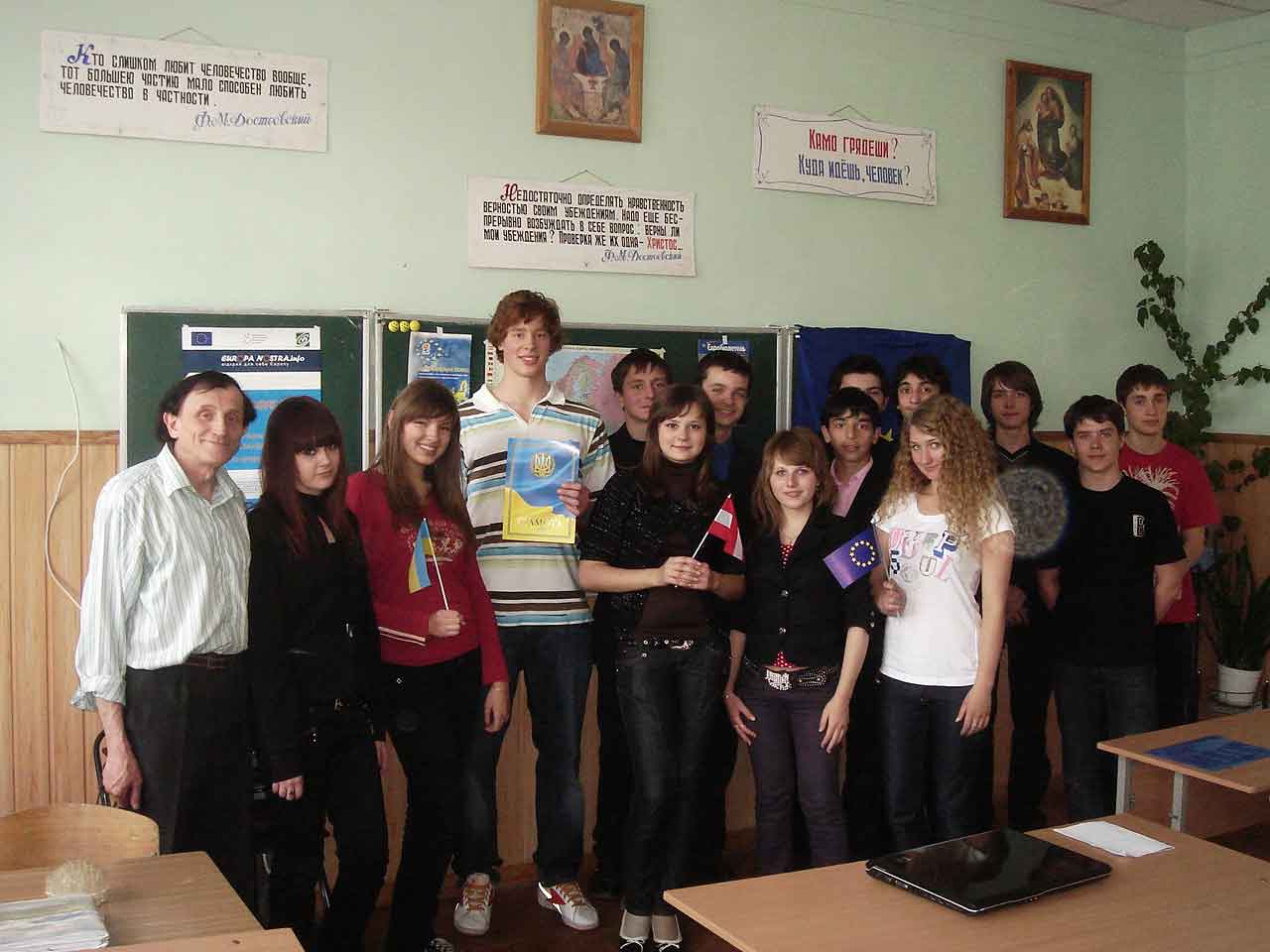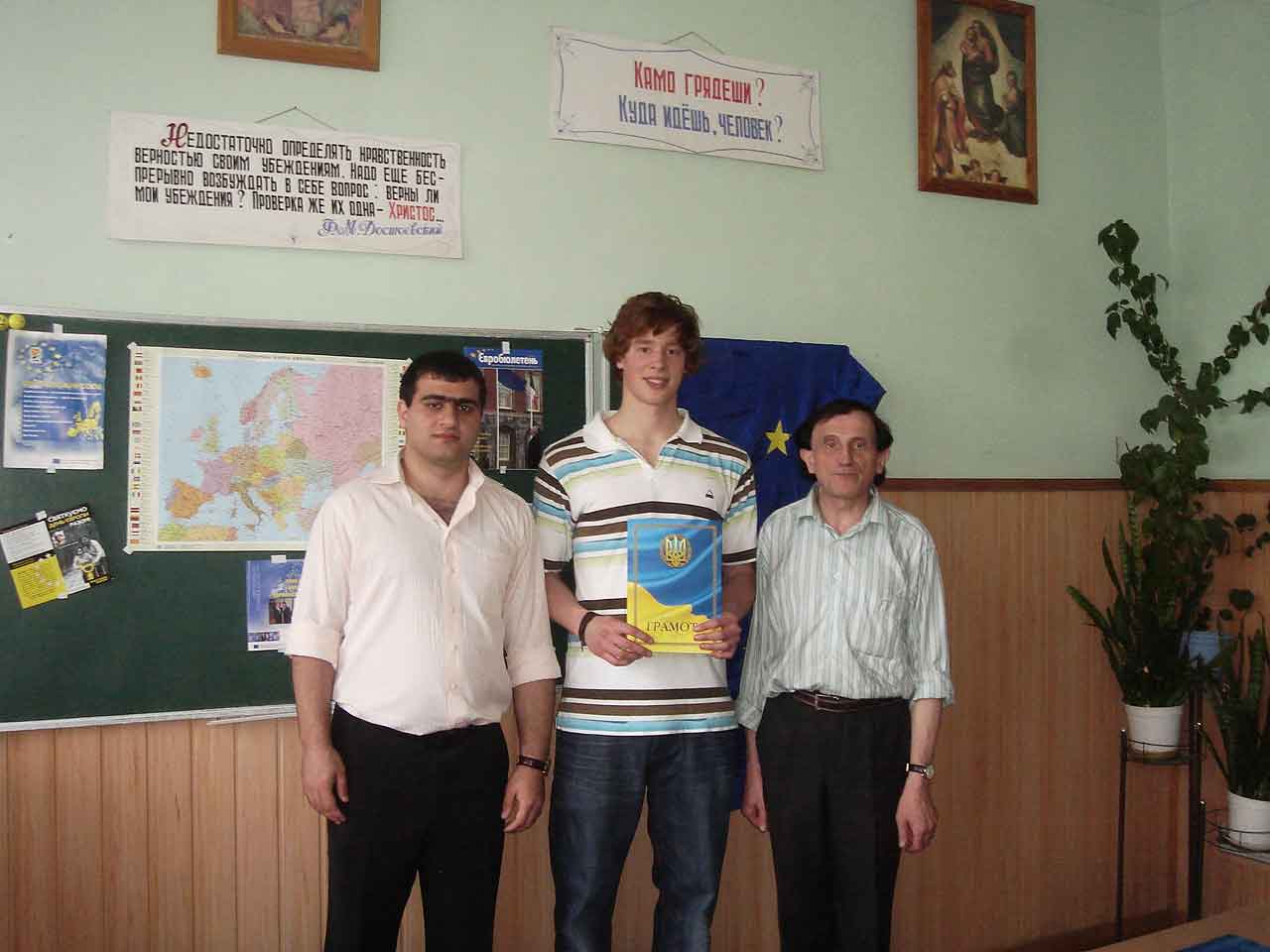European Days at the Gymnasium of Oriental Languages in Kiev
 Tuesday, 12th of May 2009 was one of the so-called "European Days" at the Gymnasium of Oriental Languages in Kiev. As the name suggests, those days were devoted to the promotion of knowledge about the European Union. During this week every day the pupils are given the possibility to get to know the separate member states of the EU, their peculiarities, as well as their interaction and relations by creating several posters or making exercises, for example, connected to this topic. Of course, it was also thought to foster the understanding of multiculturality and societal heterogeneity, in general generating awareness of how important it is for Ukraine as a state, as well as a whole society to be geared to the European Union and its values, respectively.
Tuesday, 12th of May 2009 was one of the so-called "European Days" at the Gymnasium of Oriental Languages in Kiev. As the name suggests, those days were devoted to the promotion of knowledge about the European Union. During this week every day the pupils are given the possibility to get to know the separate member states of the EU, their peculiarities, as well as their interaction and relations by creating several posters or making exercises, for example, connected to this topic. Of course, it was also thought to foster the understanding of multiculturality and societal heterogeneity, in general generating awareness of how important it is for Ukraine as a state, as well as a whole society to be geared to the European Union and its values, respectively.
Being aware of the significance of having an inhabitant of one of the EU member states talking about life in his motherland, the school's headmaster, Mykhajlo Savchenko, invited me to talk with some of his ambitious pupils about Austria. I was very proud to be given this unique opportunity on the one hand to gain such an insight into this school which is enjoying a good reputation throughout Ukraine, on the other hand to be in exchange with Ukrainian pupils interested in different cultures. Moreover, a significant part of my auditory had even once been to Austria! After my presentation I enjoyed answering questions as well as posing some myself, as it was also in my interest to get to know about the educational life in Ukraine.
Finally, after the ceremonial handover of an official document signed by Mr. Savchenko, I was given a tour though the school and even through the museum of ethnicity of the school. Frankly speaking, I was very happy that I had accepted the invitation, because my stay there made a lasting impression on me.
Alex Kirner,
Volunteer of the Ukrainian Center for Holocaust Studies
Announcements
MoreLatest News
-
Research and methodological seminar for educators in Lviv
On 15-16 June, we met with more than twenty participants - mostly teachers from Lviv - to discuss the memory of the Holocaust, other cases of genocide on Ukrainian territory, and the current challenges of working with these topics.
[More] -
History of genocides in Ukraine: studying the experience and challenges of the present. Seminar in Kyiv
On 12-13 June, a research and methodological French-Ukrainian seminar History of genocides in Ukraine: studying the experience and challenges of the present was held in Kyiv. It was organised by the Shoah Memorial (Paris) and the Ukrainian Centre for Holocaust Studies (Kyiv) with the support of the Kuras Institute of Political and Ethnic Studies.
[More] -
Educational Materials “Nazi Genocide against Roma in Ukraine, 1941-1944”
The tragic fate of Roma people during WWII still remains largely unknown in Ukraine and generally in Europe. The new educational materials play an important role in returning Roma history and culture into the history and culture of modern Ukraine, unveiling Roma cultural heritage and the tragic events of WWII genocide against them.
[More] -
(No) Children’s Stories Exhibition returned to Chernivtsi
In May-June 2024, Chernivtsi once again invited the interactive exhibition (No) Children’s Stories. This time, it was hosted by Chernivtsi Gymnasium No. 17, and initiated by history and law teacher Varvara Bodnariuk. The students of 7-9 grades volunteered to host the exhibition and during the month of the event, they gave tours to more than 400 people, including students from their school, other schools in the city, and even the mayor of Chernivtsi and a foreign delegation from Dusseldorf (Germany) with the mayor of the city.
[More] -
Learning From The Past - Acting For The Future seminar
On 18-19 May, the seminar Learning from the Past - Acting for the Future was held in Kyiv. It was a joint event of The Olga Lengyel Institute, New York, and the Ukrainian Center for Holocaust Studies, funded by the Olga Lengyel Institute for Holocaust Studies and Human Rights.
[More]




